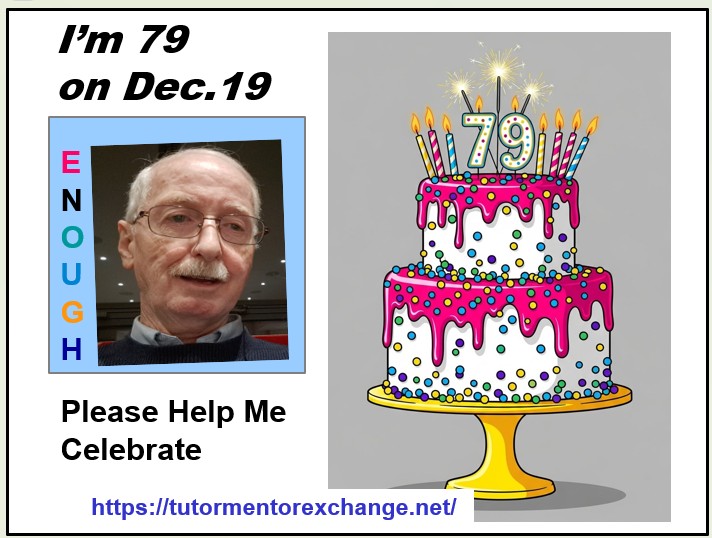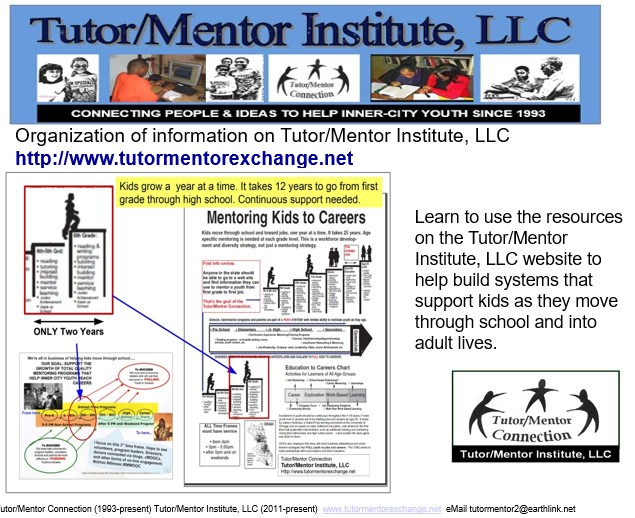Issue 246

Plan for year-end holiday giving!
The goal was to build activities that supported volunteer and student engagement, that connected programs to share ideas, and to build visibility that drew donors to the fund raising campaigns of our own program, and of others throughout Chicago.
It's mid November, which means volunteer-based tutor/mentor programs should already have campaigns in place.
Visit https://tutormentorexchange.net/
While the primary focus of this newsletter and my website and blogs is to help volunteer-based tutor, mentor and learning programs reach more youth in areas of persistent poverty, many of the sections have information that can be applied to any issue that needs support from many people, for many years.
These resources can be used by anyone, in Chicago, or around the world.
Please share this so others in your city can find and use these resources!

Is your organization ready for this? Are your volunteers, students, alumni and donors involved? Take a look at my Tutor/Mentor article and see how it draws attention to volunteer-based tutor/mentor programs throughout the Chicago region.
While this event is important it should only be a part of your year end campaigns.
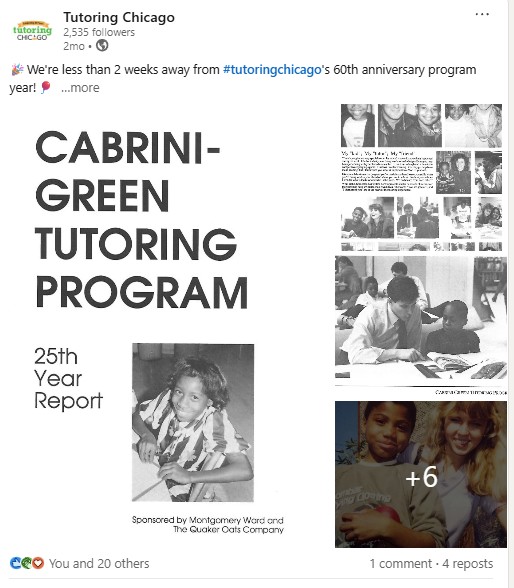
Above are images from two campaigns that I think do a great job.
At the left is an image from the Tutoring Chicago "Celebrating 60th Years" campaign. If you visit their LinkedIn feed you'll see several short videos that show archives from past years (including the 1975-1992 years when I led the program, when it was hosted at the Montgomery Ward headquarters in Chicago). You'll also see videos showing kids and volunteers in their weekly tutoring sessions. Some of these are already on their website. You can also find them on Instagram.
At the right is an image from the PEAK (Partnership to Educate and Advance Kids) Chicago campaign. It's a series of photos that I've seen on LinkedIn and Instagram. One of those is a map showing where they provide services and where their students live, emphasizing how "over 60% of PEAK Scholars live in Chicago's most vulnerable neighborhoods". I've been trying to educate donors to seek programs that support kids in those neighborhoods. By including this map in their campaign, PEAK Chicago is emphasizing this. See more on their website.
Other programs are also doing great work at showcasing there services. Browse my lists and look at websites and social media. Use your own blog to highlight campaigns that you feel are effective. Share them with me on social media so I can share them with others.
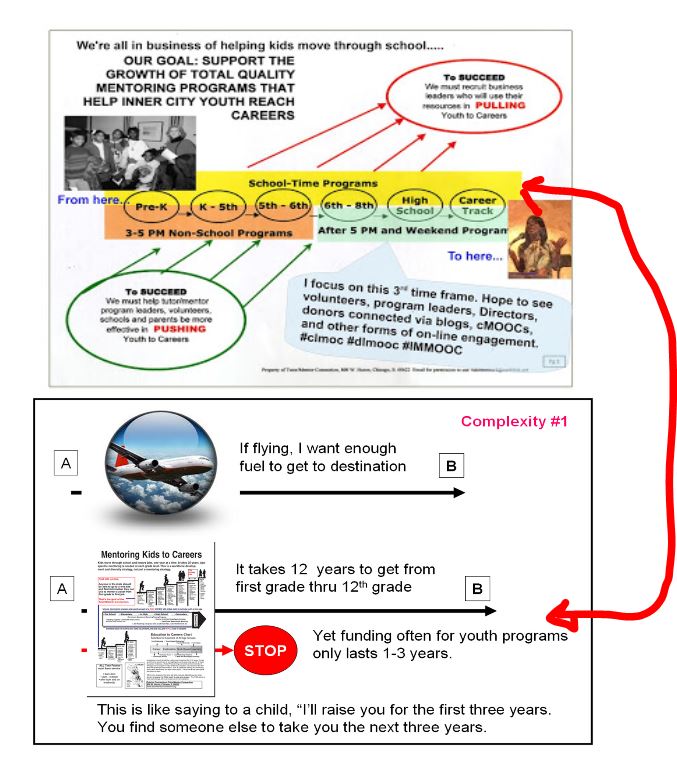
Long-term funding needed
I've included these images on many blog article and visual essays, to emphasize the need for multi-year funding that helps kids in economically disadvantaged neighborhoods get extra tutor, mentor and learning support that helps them move safely through school and into adult lives. When I say "multi year" I don't me 3-5 years. I mean 10 to 20 years!
In the current political crisis, those organizations that are dependent on Federal funding, are facing even greater challenges than in the past.
I encourage you to read some of my philanthropy articles on the Tutor/Mentor blog, and in my web library. Then look at the Role of Leaders article that I posted on Substack.
Volunteers in on-going tutor/mentor programs can do more than serve as tutors and mentors. They can help open doors to funding. They can even dig deeper and learn why traditional philanthropy is inadequate and organize campaigns to change donor practices. They can even help raise money to fund a Tutor/Mentor Connection-type program at an area university, that trains students to lead programs, and lead efforts to provide necessary operating dollars.
Read some of my Tipping Point articles, too. Share with others.
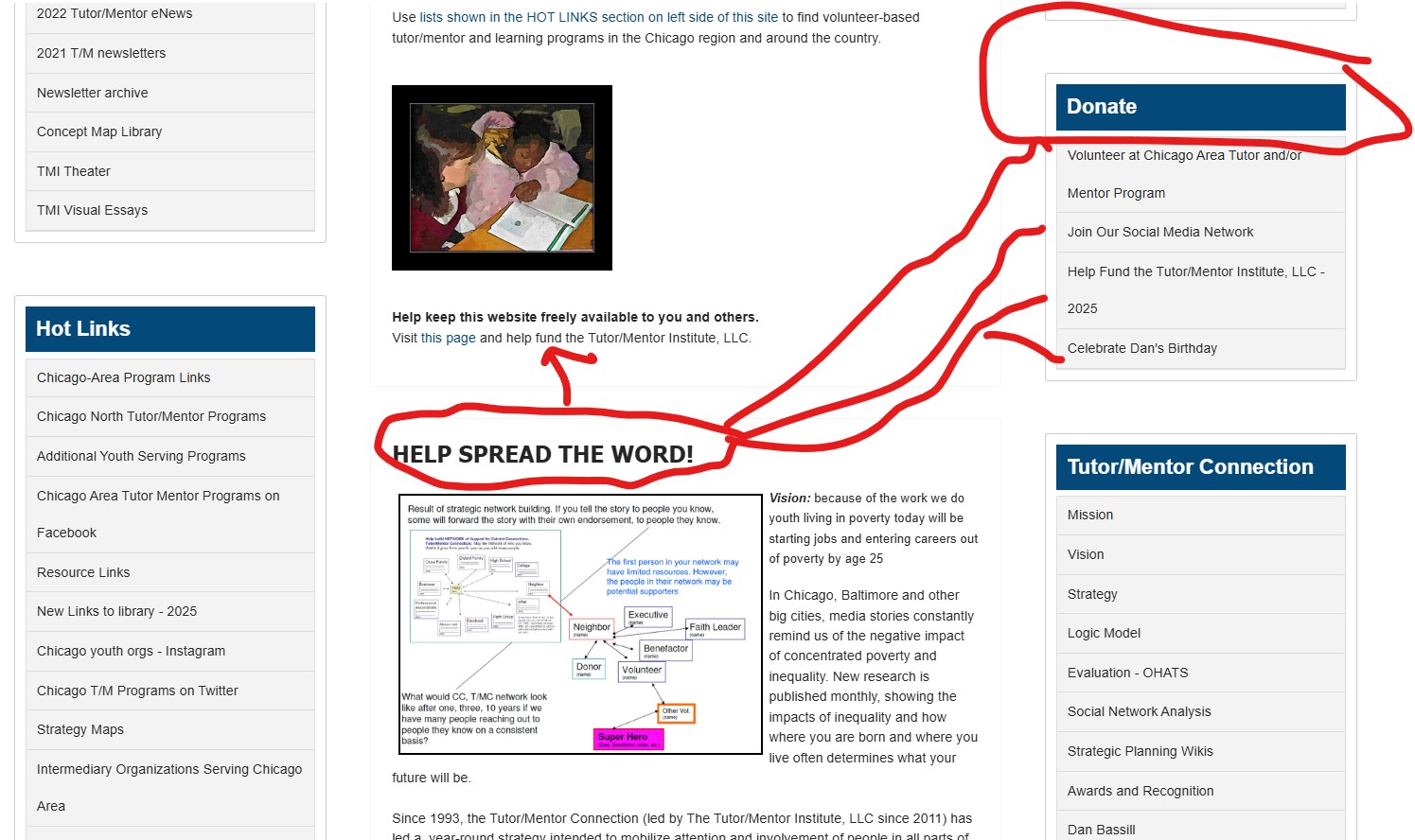
At the right I show links to four pages.
1 - volunteer at a Chicago area tutor/mentor program
2 - connect with me on one of many social media platforms
3 - help fund the Tutor/Mentor Institute, LLC
4 - help me celebrate my 79th birthday!
As you enjoy your Thanksgiving and Year-end holidays I hope you'll look at these ways to support youth in organized tutor/mentor programs throughout Chicagoland. If you're in another city, share these ideas and help them form a similar strategy.

January is National Mentoring Month - be prepared
National Mentoring Month is celebrated in the USA and in Canada. While I have links below to USA mentoring resources this tip sheet was shared by the Alberta Mentoring Partnership. Visit their website and you'll find a wealth of resources that can be used throughout the year.
At the end of January will be the annual Mentoring Summit. I've attended in the past and have written a few blog articles to share some of my own thoughts. Click here to read them.
Then take a look at this article urging event organizations to use network analysis tools like NODEXL to map participation and show connections between participants.
Then look at this article where I show a use of KUMU to show connections within a university. If you have examples of organizations doing this type of mapping, please share them.
Below are resources to use.
(I repeate many of these each month. That does not mean the information is old. These websites keep adding new resources to their own sites!)
* Building Trust and Security while enabling large-scale collaboration - click here
* Policy Link - A National Research and Action Institute - click here
* Extensive tutoring resources on Educate. Radiate. Elevate website - click here
* Meaning and action in a time of democratic crisis - Fighting Forward Series 2025 - click here
* Grantmakers for Education - click here
* AfterSchool Alliance resources - click here
* Why nonprofits struggle to network -- and how that's holding us back - click here
* MENTOR celebrates 35 years of support for mentoring in the USA and the world - click here
* National Mentoring Resource Center - click here
* UCLA Center resources - click here; Guide to Learning Supports pdf - click here
* Every Hour Counts - network of intermediaries building after school systems - click here
* MyChiMyFuture - Chicago youth programs map and directory. click here; visit the website - click here
* Chicago Mentoring Collaborative - click here
* Chicago Learning Exchange supports Out-of-School-Time community in Chicago - click here
* ACT Now - Championing Quality Afterschool Programs in Illinois - click here
* To & Through Project website - click here
* Center for Effective Philanthropy - click here
* Forefront -Illinois' statewide association of nonprofits, foundations and advisors. click here
* YouthToday online magazine - click here
* South Side STEM Asset maps - read about using maps - click here
* Incarceration Reform Resource Center - click here
* Prison Policy Initiative - click here
Read These Tutor/Mentor blog articles
(Do you have a blog? Share it on social media.)
Engaging Universities. Who's Connected? - click here
Engage Youth in Writing Activities - click here
After the March, Do the Planning - click here
"Enough Is Enough" on Substack.com - click here
Reaching Youth in High Poverty Areas - click here
Drawing from My Archives - click here
Tipping Point articles - add Vu Le to your reading. - click here
How tp Use the Tutor/Mentor Blog - click here
Bookmark these Tutor/Mentor Resources
* Lists of Chicago area, volunteer-based tutor, mentor programs - click here
* Homework help and volunteer training resources - click here
* Resource Library - click here
* Strategy essays by Tutor/Mentor - click here
* Work done by interns in past - click here
* Maps and Map-Stories from past 30 years - click here
* Political Action resources - click here, and click here
* Featured collections on Wakelet - click here
* Tutor/Mentor Institute Videos - click here
* About T/MI articles on blog - click here
* History of T/MC - T/MI articles - click here
* Create a New Tutor/Mentor Connection - click here
* Reaching out to Universities to adopt the Tutor/Mentor Connection strategy - click here
* Chicago Youth Serving Organizations in Intermediary Roles - click here to view a concept map showing many organizations working to help improve the lives of Chicago area youth. Follow the links. If you know of other intermediaries that should be added please share that information with Dan Bassill.
Thank you for reading this month's newsletter.
Please share this with people you know who work in non-school youth serving programs, or in sectors that should be strategically supporting such programs, such as business, philanthropy, education and public policy. If they are not receiving these newsletters then we have no way of engaging them. Also encourage friends, family, co-workers to sign up to receive this newsletter.
I encourage others to duplicate what I'm doing. Write a blog and share your own vision, strategy and challenges. Share your link and I'll add it to this list in the Tutor/Mentor library.
View current and past newsletters at this link.
To subscribe, just Click here.
(If you subscribe, don't forget to respond to the confirmation email).

Tutor/Mentor Connection (1993-present)
Tutor/Mentor Institute, LLC (2011-present)
Serving Chicago and the world since 1993. Connect with Dan Bassill, founder and leader on one of the social media platforms.
eMail Dan at
Social Media Connections
Do a web search for "tutor mentor" and you'll find us on many platforms.
Connect with Dan at
BlueSky - https://bsky.app/profile/tutormentor.bsky.social
Dan Bassill on LinkedIn
Tutor/Mentor Institute, LLCon Facebook group
Dan Bassill on Facebook Page
Dan Bassill on Mastodon - https://mastodon.social/@tutormentor1,
https://mastodon.garden/@tutormentor1 and @
Dan Bassill on Instagram and on Twitter (X)
Dan Bassill on Medium - https://medium.com/@danielfbassill
Dan Bassill on Substack.com - https://substack.com/@danielbassill319958?


